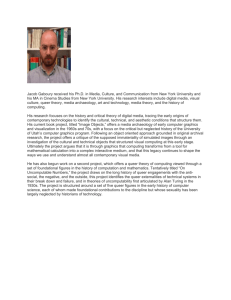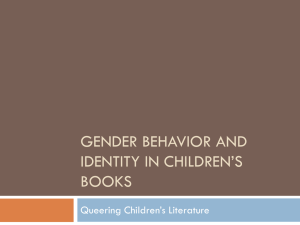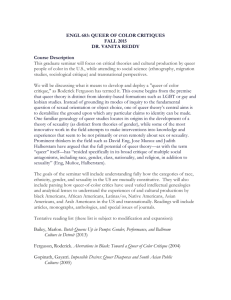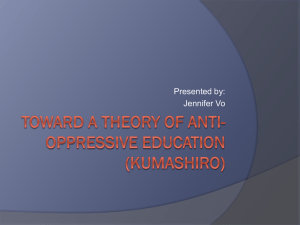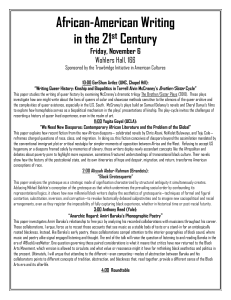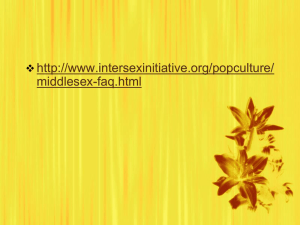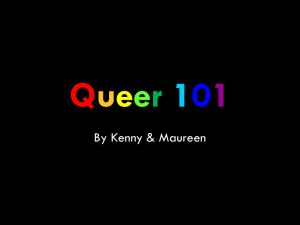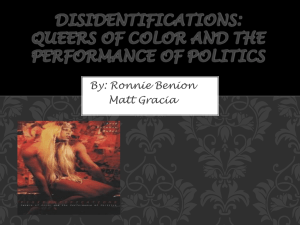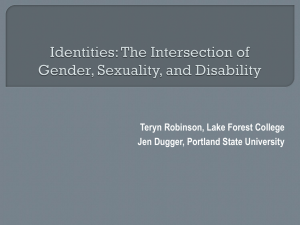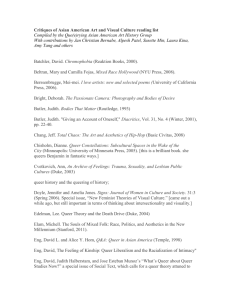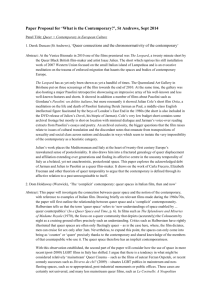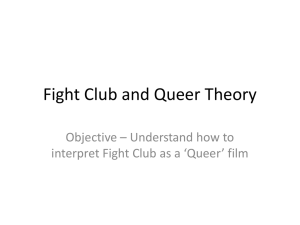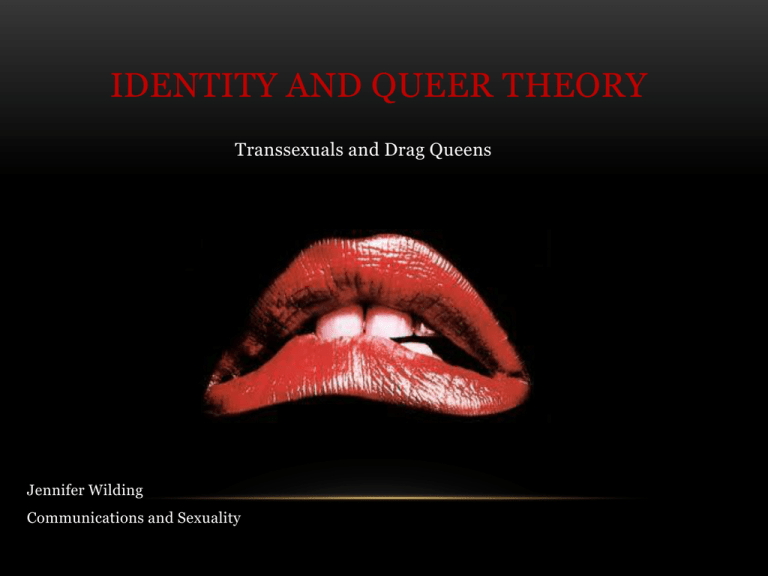
IDENTITY AND QUEER THEORY
Transsexuals and Drag Queens
Jennifer Wilding
Communications and Sexuality
CONTENTS OF PRESENTATION
•
This presentation is based on my
resent research on transsexuals and
drag queens. I came across the queer
theory and decided to opt for an
identity based presentation given that
to every person identity and finding
oneself is part life's challenges.
•
For this presentation I investigated
the themes of identity in the
circumstances that involve the
“queer” community, theory and
differences within it.
DRAG QUEEN
According to Merriam-Webster: a drag
queen is a male homosexual who dresses
as a woman especially for comic or
theatrical effect
TRANSVESTITE
A transvestite: is a person and
especially a man who adopts the
dress and often the behavior typical
of the opposite sex especially for
purposes of emotional or sexual
gratification.
Eddy Izzard: "Women wear what
they want and so do I".
"Most transvestites fancy women".
TRANSSEXUAL
Lea T: Transsexual Brazilian model
•
Finally in the same dictionary
the definition of a transsexual: a
person who psychologically
identifies with the opposite sex
and may seek to live as a
member of this sex especially by
undergoing surgery and
hormone therapy to obtain the
necessary physical appearance
(as by changing the external sex
organs)
IDENTITY
•
It is only natural for a human being to find the place where he or she is
accepted and/or loved. We are social creatures who to a certain extent
define ourselves with what we are surrounded with and what others may
believe that we are. The purpose to this is to be able to explain ourselves.
To define who we are in the simplest of terms. Sometimes a simple word
doesn’t cut it.
•
Of course we have pre determined tendencies (John/Joan case) and these
may only help find that place or group where we may feel free to express
our true selves but this need for acceptance may take us in a direction that
also challenges who we really are.
•
In the clip above I wanted to show what the definitions of these terms can
be in a more colloquial manner and also through the perspective of a
person within the group. Also toward the end we notice how much
pressure there can be within the same group.
“It's really difficult because you fight
with all the world. You fight with
your family. You fight with yourself
too.”
“I wish I could accept my body as a man. I
would be a straight guy, having a girlfriend
and a family, daughters, married, a normal
life, but it's something in your brain.”
QUEER THEORY
•
David Halperin says : “Queer is by definition whatever is at odds with the
normal, the legitimate, the dominant. There is nothing in particular to
which it necessarily refers. It is an identity without an essence. 'Queer'
then, demarcates not a positivity but a positionality vis-à-vis the
normative.”
•
In “Must Identity Movements Self-Destruct? A Queer Dilemma” Joshua
Gamson discusses queer theory and queer politics paying particular
interest in identity.
•
“In the hands of many letter writers, in fact, queer becomes simply a
shorthand for “gay, lesbian, bisexual, and transgender,” much like “people
of color” becomes an inclusive and difference erasing short-hand for a
long list of ethnic, national, and racial groups.”
•
Also from Joshua Gamson “Eric Marcus seeks to distinguish himself:
‘Queer is not my word because it does not define who I am or represent
what I believe in… I’m a man who feels sexually attracted to people of the
same gender. I don’t feel attracted to both genders. I’m not a woman
trapped in a man’s body, nor am I a man trapped in a woman’s body. I’m
not someone who enjoys or feels compelled to dress up in clothing of the
opposite gender and I’m not a “queer straight,” a heterosexual who feels
confined by the conventions of straight sexual expression… I don’t want to
be grouped under the all encompassing umbrella of queer… because we all
have different lives, face different challenges, and don’t necessarily share
the same aspirations. (1993: 14)”
•
Queer theory and activism has a positive effect by teaching our society that
there is no real “norm” and that being “normal” is a social construction
created by our own language. "These names: gay, queer, homosexual are
limiting. I would love to finish with them. We're going to have to decide
which terms to use and where we use them. For me to use the word
''queer'' is a liberation; it was a word that frightened me, but no longer."
-Derek Jarman
CONCLUSION
•
Language itself can be very limiting and society must challenge the custom
of labeling and stereotyping. Hiding behind words can sometimes be
comforting but we need to realize that we are far more than that. We
bound not only others but ourselves with names and divisions. We are not
our gender or our sexual preferences or our nationality or our skin. We are
so much more than the sum of our parts. We can choose the words that
capture us and let others choose their own and this way we can let our
essential selves shine through.
•
And on a lighter and more fun note…

